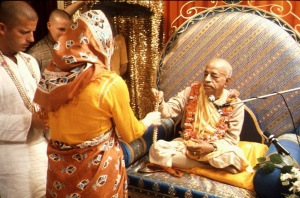CC Madhya 20.237: Difference between revisions
No edit summary |
(Vanibot #0054 edit - transform synonyms into clickable links, which search similar occurrences) |
||
| Line 17: | Line 17: | ||
<div class="synonyms"> | <div class="synonyms"> | ||
''hayaśīrṣa-pañcarātre'' | ''[//vanipedia.org/wiki/Special:VaniSearch?s=hayaśīrṣa&tab=syno_o&ds=1 hayaśīrṣa]-[//vanipedia.org/wiki/Special:VaniSearch?s=pañcarātre&tab=syno_o&ds=1 pañcarātre]'' — the revealed scripture named the ''Hayaśīrṣa-pañcarātra''; ''[//vanipedia.org/wiki/Special:VaniSearch?s=kahe&tab=syno_o&ds=1 kahe]'' — says; ''[//vanipedia.org/wiki/Special:VaniSearch?s=ṣola&tab=syno_o&ds=1 ṣola]-[//vanipedia.org/wiki/Special:VaniSearch?s=jana&tab=syno_o&ds=1 jana]'' — sixteen personalities; ''[//vanipedia.org/wiki/Special:VaniSearch?s=tāra&tab=syno_o&ds=1 tāra] [//vanipedia.org/wiki/Special:VaniSearch?s=mate&tab=syno_o&ds=1 mate]'' — according to this opinion; ''[//vanipedia.org/wiki/Special:VaniSearch?s=kahi&tab=syno_o&ds=1 kahi]'' — I shall describe; ''[//vanipedia.org/wiki/Special:VaniSearch?s=ebe&tab=syno_o&ds=1 ebe]'' — now; ''[//vanipedia.org/wiki/Special:VaniSearch?s=cakra&tab=syno_o&ds=1 cakra]-[//vanipedia.org/wiki/Special:VaniSearch?s=ādi&tab=syno_o&ds=1 ādi]-[//vanipedia.org/wiki/Special:VaniSearch?s=dhāraṇa&tab=syno_o&ds=1 dhāraṇa]'' — the holding of weapons, beginning with the disc. | ||
</div> | </div> | ||
Latest revision as of 22:40, 19 February 2024

A.C. Bhaktivedanta Swami Prabhupada
TEXT 237
- hayaśīrṣa-pañcarātre kahe ṣola-jana
- tāra mate kahi ebe cakrādi-dhāraṇa
SYNONYMS
hayaśīrṣa-pañcarātre — the revealed scripture named the Hayaśīrṣa-pañcarātra; kahe — says; ṣola-jana — sixteen personalities; tāra mate — according to this opinion; kahi — I shall describe; ebe — now; cakra-ādi-dhāraṇa — the holding of weapons, beginning with the disc.
TRANSLATION
“According to the Hayaśīrṣa-pañcarātra, there are sixteen personalities. I shall now describe that opinion of how They hold the weapons.
PURPORT
The sixteen personalities are as follows: (1) Vāsudeva, (2) Saṅkarṣaṇa, (3) Pradyumna, (4) Aniruddha, (5) Keśava, (6) Nārāyaṇa, (7) Mādhava, (8) Govinda, (9) Viṣṇu, (10) Madhusūdana, (11) Trivikrama, (12) Vāmana, (13) Śrīdhara, (14) Hṛṣīkeśa, (15) Padmanābha and (16) Dāmodara.